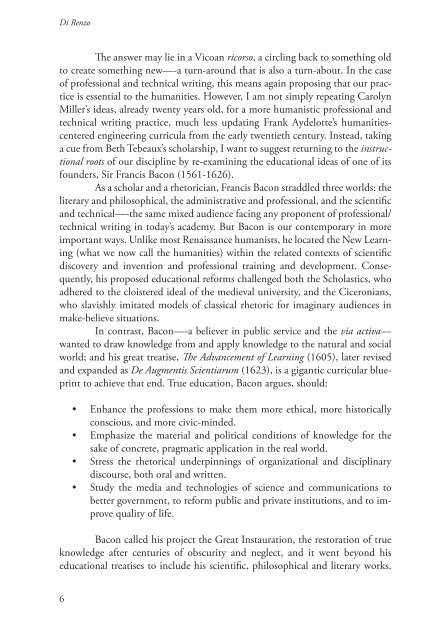Design Discourse - Composing and Revising Programs in Professional and Technical Writing, 2010a
Design Discourse - Composing and Revising Programs in Professional and Technical Writing, 2010a
Design Discourse - Composing and Revising Programs in Professional and Technical Writing, 2010a
You also want an ePaper? Increase the reach of your titles
YUMPU automatically turns print PDFs into web optimized ePapers that Google loves.
Di Renzo<br />
The answer may lie <strong>in</strong> a Vicoan ricorso, a circl<strong>in</strong>g back to someth<strong>in</strong>g old<br />
to create someth<strong>in</strong>g new—-a turn-around that is also a turn-about. In the case<br />
of professional <strong>and</strong> technical writ<strong>in</strong>g, this means aga<strong>in</strong> propos<strong>in</strong>g that our practice<br />
is essential to the humanities. However, I am not simply repeat<strong>in</strong>g Carolyn<br />
Miller’s ideas, already twenty years old, for a more humanistic professional <strong>and</strong><br />
technical writ<strong>in</strong>g practice, much less updat<strong>in</strong>g Frank Aydelotte’s humanitiescentered<br />
eng<strong>in</strong>eer<strong>in</strong>g curricula from the early twentieth century. Instead, tak<strong>in</strong>g<br />
a cue from Beth Tebeaux’s scholarship, I want to suggest return<strong>in</strong>g to the <strong>in</strong>structional<br />
roots of our discipl<strong>in</strong>e by re-exam<strong>in</strong><strong>in</strong>g the educational ideas of one of its<br />
founders, Sir Francis Bacon (1561-1626).<br />
As a scholar <strong>and</strong> a rhetorician, Francis Bacon straddled three worlds: the<br />
literary <strong>and</strong> philosophical, the adm<strong>in</strong>istrative <strong>and</strong> professional, <strong>and</strong> the scientific<br />
<strong>and</strong> technical—-the same mixed audience fac<strong>in</strong>g any proponent of professional/<br />
technical writ<strong>in</strong>g <strong>in</strong> today’s academy. But Bacon is our contemporary <strong>in</strong> more<br />
important ways. Unlike most Renaissance humanists, he located the New Learn<strong>in</strong>g<br />
(what we now call the humanities) with<strong>in</strong> the related contexts of scientific<br />
discovery <strong>and</strong> <strong>in</strong>vention <strong>and</strong> professional tra<strong>in</strong><strong>in</strong>g <strong>and</strong> development. Consequently,<br />
his proposed educational reforms challenged both the Scholastics, who<br />
adhered to the cloistered ideal of the medieval university, <strong>and</strong> the Ciceronians,<br />
who slavishly imitated models of classical rhetoric for imag<strong>in</strong>ary audiences <strong>in</strong><br />
make-believe situations.<br />
In contrast, Bacon—-a believer <strong>in</strong> public service <strong>and</strong> the via activa—<br />
wanted to draw knowledge from <strong>and</strong> apply knowledge to the natural <strong>and</strong> social<br />
world; <strong>and</strong> his great treatise, The Advancement of Learn<strong>in</strong>g (1605), later revised<br />
<strong>and</strong> exp<strong>and</strong>ed as De Augmentis Scientiarum (1623), is a gigantic curricular bluepr<strong>in</strong>t<br />
to achieve that end. True education, Bacon argues, should:<br />
• Enhance the professions to make them more ethical, more historically<br />
conscious, <strong>and</strong> more civic-m<strong>in</strong>ded.<br />
• Emphasize the material <strong>and</strong> political conditions of knowledge for the<br />
sake of concrete, pragmatic application <strong>in</strong> the real world.<br />
• Stress the rhetorical underp<strong>in</strong>n<strong>in</strong>gs of organizational <strong>and</strong> discipl<strong>in</strong>ary<br />
discourse, both oral <strong>and</strong> written.<br />
• Study the media <strong>and</strong> technologies of science <strong>and</strong> communications to<br />
better government, to reform public <strong>and</strong> private <strong>in</strong>stitutions, <strong>and</strong> to improve<br />
quality of life.<br />
Bacon called his project the Great Instauration, the restoration of true<br />
knowledge after centuries of obscurity <strong>and</strong> neglect, <strong>and</strong> it went beyond his<br />
educational treatises to <strong>in</strong>clude his scientific, philosophical <strong>and</strong> literary works.<br />
6


















